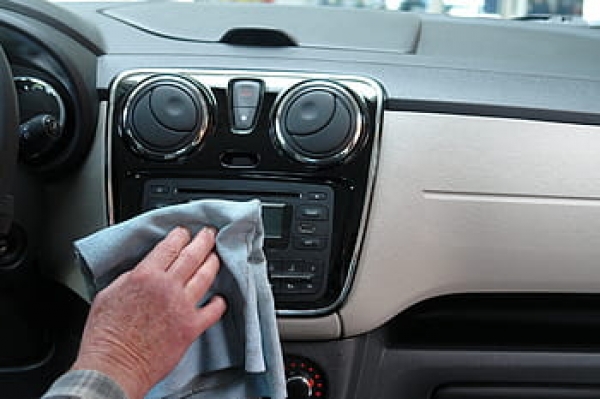Welcome to Crossing Creeks RV Resort & Spa in the heart of iconic Blairsville
Disinfecting Your Motorhome Cockpit and Tow Vehicle Interior Featured
Written by MattFor RVers still on the road, it’s important to keep the cockpit of your motorhome or tow vehicle disinfected during the coronavirus pandemic.
True, many states have stay-at-home orders in effect. But thousands of RVers live full-time in their RVs. Many thousands more who routinely hit the road for much of the year probably headed out before extent of the pandemic was revealed. Even as states reopen, following best practices to fight the spread of pathogens that cause the Covid-19is advisable.
Paramount are properly disinfecting your hands and your vehicle interior.
It’s not necessary to wear a mask when you’re inside your vehicle, but put one on before going into a store or to a gas pump, and wear disposable gloves. A mask protects you a bit more and everyone around you much more.
For tips on keeping your RV living area free of coronavirus pathogens, see our companion piece.
Pumping Fuel
Perhaps nothing you touch as an RVer is more likely than a fuel pump handle to be touched by many other people. That means it could contain coronavirus pathogens.
Consumer Reports suggests that you wear disposable gloves when handling a fuel pump, either gas or diesel. You might be thinking, Well, I always wear gloves when I pump diesel. If you store those gloves away after refueling and wear them again the next time you pump, that’s not a good idea right now.
Gloves that touch a contaminated pump handle or contaminated pump buttons may pick up pathogens and retain them. How long? Reuters reports that the National Institute of Allergies and Infectious Diseases found that coronavirus pathogens could last several hours to several days, depending on the surface. Disposable gloves can help to counteract that threat. During the pandemic, cover your hands with disposable gloves when pumping.
Disposable gloves aren’t easy to come by right now. If you can’t get them, try using two plastic food storage bags over your hands and properly dispose of them the same as you would gloves.
Clean your hands before getting back into your vehicle with a hand disinfectant. That way, you’re more nearly certain not to deposit pathogens on interior surfaces. If you cant find hand disinfectant, keep soap—either bar soap or soft—plus a spray bottle of water and some paper towels handy, and wash for 20 seconds before getting back in your vehicle. Put them in a small caddy so you can place them on or beside your vehicle for easy access before you get back in. Dispose of used paper towels or wipes immediately.
Disinfecting Automotive Interiors
Disinfecting the cockpit of your motorhome or tow vehicle requires the most attention during actual travel. It’s where you’re most likely to deposit pathogens from your hands as you re-enter after stopping for fuel, food or bathroom breaks. Food has not been found to be a transmitter of pathoens.
Wear disposable gloves to disinfect an interior, then wash your hands for 20 seconds with soap and water after you dispose of the gloves.
Do use:
- Disinfectant wipes that do not contain bleach. Use on hard surfaces, especially the steering wheel. Also use them to clean door handles, armrests, control switches and buttons, displays screens, shift levers and paddles, seat belt buckles and the instrument panel cover.
- Disinfectant, such as Lysol, sprayed onto a paper towel. Apply it to the items above.
- Alcohol solutions containing at least 70 percent isopropyl alcohol. They can be used on just about any interior surface, but be warned that keeping alcohol in the vehicle interior is not recommended, since high temperatures may cause alcohol to boil.
- Soap and water, including dishwasher liquid diluted by water. As noted above for hand washing, soap breaks down the protective covering on coronavirus pathogens. It can do the same on interior surfaces, but it will require some scrubbing—not too much— with a towel or sponge. Rinse with a towel soaked in clear water. Along with dedicated leather cleaners, Ivory soap and water is recommended for leather, followed by a leather conditioner.
Do Not Use
- Bleach. It can weaken plastic surfaces, making them soft, and can permanently discolor fabrics and other porous materials.
- Hydrogen peroxide. The reasons are the same as for bleach.
- Ammonia or cleaners that contain it, such as blue window cleaner. Ammonia is OK on windows if you’re careful about applying it. Spray onto a paper towel, not onto the window, to avoid excess spray. Ammonia will break down the surfaces of plastics, and it can damage touch screens.
Wash Hands Frequently
The CDC recommends washing your hands frequently, 20 seconds each time, with soap and water. Keep your hands from your face as much as possible, even if you touched only a disinfected surface. Launder cleaning cloths with other laundry, using the hottest setting appropriate for the load. Dispose of paper towels and sponges, which may trap germs.
Leave a comment
Make sure you enter all the required information, indicated by an asterisk (*). HTML code is not allowed.
